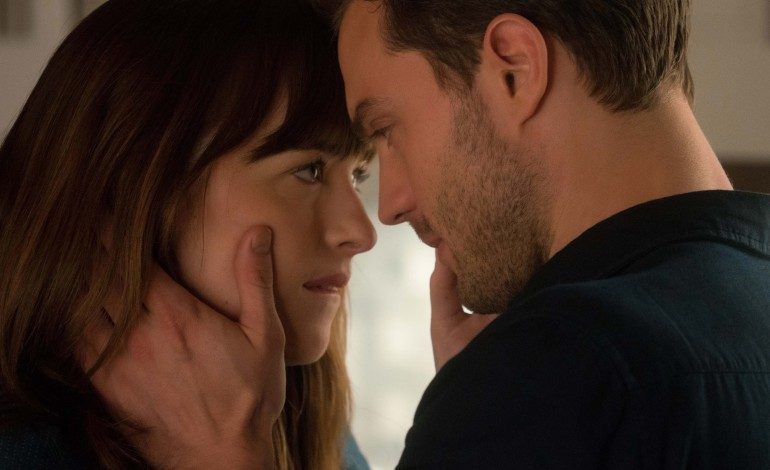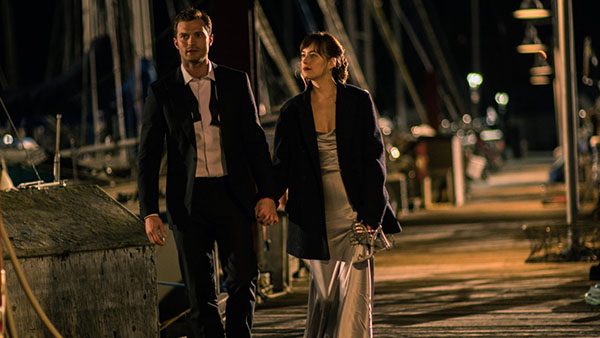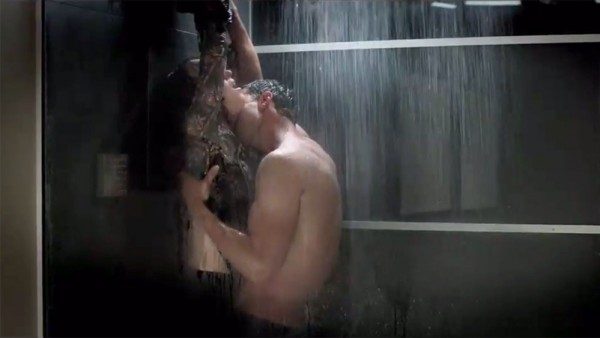

The “so bad, it’s good” formula really gets tested with Fifty Shades Darker, the second film based off of E.L. James’ kink-addled book series. This sequel – this time directed by James Foley (the filmmaker who previously helmed the quite sexy Glengarry Glen Ross and who has more recently taken the lead on episodes of House of Cards and Billions) – to put it bluntly, is preposterously, nearly elementally bad. Bad enough that it’s nearly worth recommending in that same vein that we can’t quite turn away from a disastrous car wreck on the side of the road. Bad enough that such technical and structural inefficiencies kind of need to be seen and heard to be believed. Bad enough to provide proof that, simply, I’m not alone. Nearly.
More pointedly, Fifty Shades Darker affirms the featherweight achievements that director Sam Taylor-Johnson provided in Fifty Shades of Grey a mere two years ago. While hardly an erotic masterwork, Taylor-Johnson and screenwriter Kelly Marcel managed to weave a slight thread of complexity and nuance into the silly romance between wide-eyed ingenue Anastasia Steele (Dakota Johnson) and broody, S&M- obsessed billionaire Christian Grey (Jamie Dornan), as well as iron out the literal kinks with a smidgen of self-awareness. Taylor-Johnson managed to coat the first film with a cozy sex-positive allure and slightly flesh-out the sex-by-transaction plot in a non-heavy handed way that read even as slightly feminist. Reportedly, it was behind-the-scenes tensions that led to Taylor-Johnson’s departure. The audience, in turn, is the actual loser.
Picking up some time following the events of the first film – which ended with Anastasia leaving Christian aghast that his sexual proclivities may never be tamed – the duo decide to give their relationship a second go, under the assumption that Christian is a changed man. Anastasia counters this rekindling can only proceed with an agreement of “no rules, no punishments and no secrets.” Christian, whiffing a mild suggestion that his uncontrollable id is under control, aligns that this time will be different. As if. The gender and sexual politics only get murkier from this point forward, that is if its audience is still awake to notice. For instance, Christian’s insecurity and open hostility with Anastasia’s new boss – a cocksure book editor whose intentions are laid out quickly and confirmed later on – ought to be enough to start a bra-burning revolt and that’s just the tip of the iceberg of the gender transgressions in store.
On terms of plot, that silly thing, there’s precious little in Fifty Shades Darker. Despite the contrived introductions of a few villains who hem and haw into the proceedings with the hope or something-something or tearing a part this bad romance, narrative momentum or even a hint of coherency is forever on the back-burner, if not disregarded entirely. That may certainly be a fault of James’ prose (confession: I have not read the books on which this franchise is based) but is indefinitely hindered by the lackadaisical, sloppy staging set up in Niall Leonard’s screenplay (Leonard happens to be married to James.) Instead of going “darker” as touted in its moniker, the film grows shaggier, soapier and dumber as it progresses, lunging towards a cornball finale that would have read as regressive and old-hat back in the heyday of Dynasty. In this sense, Kim Basinger joins the cast to fill the Joan Collins card.
As characters, Christian and Anastasia are thinly designed constructs to begin with, yet both are thornier and prove ever more inscrutable as Fifty Shades Darker bumbles along. In the first outing, Anastasia was presented – somewhat imaginatively – as a sort of lost Jane Austen creation, a dithering but guileless young woman who fancied a fine romance yet still had a backbone of independent resolve. It was a lightweight conceit, but Johnson was able to charmingly channel into something while enduring Christian’s clamps and assorted restraints without the sense that her Anastasia was being completely objectified. That sense of care is lost in this second outing as is any sensitivity towards the character; it’s more than a little disturbing when Anastasia is forced to warble the line “You know I love to work,” as her boyfriend is attempting to rip her independence away. Meanwhile, Christian, nothing more than a gloomy rich kid with an Oedipal complex, continues to read as little more than a well-dressed (and undressed) plutocrat of the American Psycho variety.
Furthermore, the biggest obstacle in Fifty Shades of Grey was the stiff, fussy chemistry between Johnson and Dornan, a problem that isn’t resolved here. Megawatt movie star charisma can save many a silly, plot-free romance, yet the spark here – despite the body parts and bedroom shenanigans on display – might as well be between brother and sister, so little heat it brings. Which gets to the larger point of what the hell it all means in the first place, aside from a quick buck. With the sexual novelty diminished, the threadbare elements that made the first film easily digestible squashed and the characters by extension both neutered and rendered less likable, Fifty Shades Darker appears to be nothing less than a sluggish means to end – which would be the third chapter heading to theaters next year. Thankfully, that will be the last.
Verdict: 1 out of 5
A limp and soggy second chapter. If the first Fifty Shades film – released two years ago – was dressed-up trash (be it polished and slightly self-aware), Fifty Shades Darker is quite simply trash. Pungent and borderline offensive trash at that. With its non-existent plot, sluggish pace and chemistry-free leads, this second installment in E.L. James’ erotic riff, is tedious to watch and an utterly joyless affair. Even the sex scenes – the supposed raison d’etre of the entire endeavor – are no fun.



